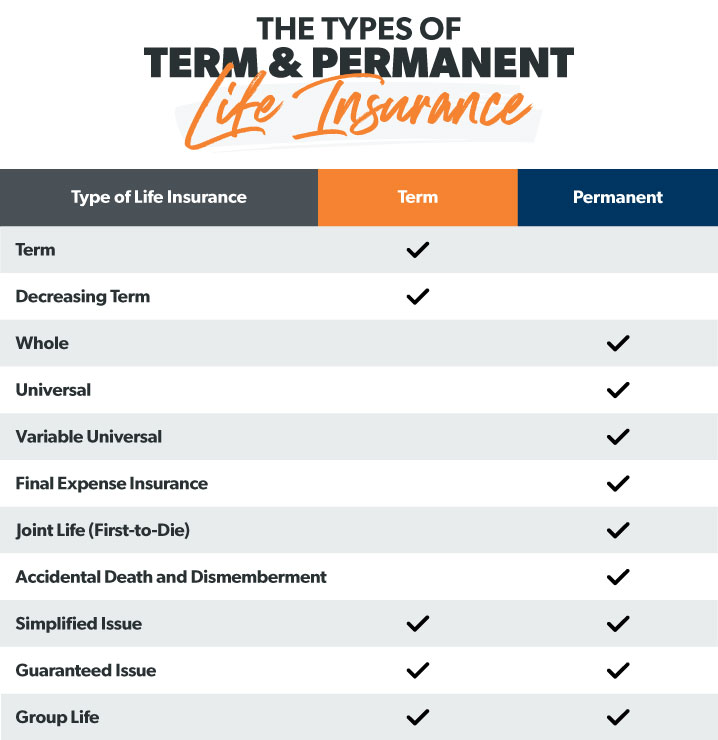
What is Life Insurance?
Life insurance is a contract between an insured person and an insurance company, a promise of compensation for loss of life in exchange for regular premium payments.
Definition and purpose of life insurance
It’s a powerful financial tool whose purpose extends beyond covering death-related expenses. It serves as an income replacement, investment portfolio, and cushion against debts.
Importance of life insurance for financial protection
Furthermore, life Insurance stands as a guarantee for financial protection. It’s both reassurance and proactive planning, shielding loved ones from unforeseen financial hardships following the policyholder’s demise.

Types of Life Insurance Policies
In the financial landscape, life insurance plays an instrumental role when it comes to safeguarding one’s future. It is a contract that offers financial coverage to the policyholder’s family in case of their untimely demise. Here are three main types of life insurance policies, each with unique features aimed at addressing different needs and objectives.
Term life insurance
They term it as pure protection plan; it protects one’s family by offering death benefits for a specified period.
Whole life insurance
A permanent plan that delivers lifelong coverage. It not only provides a death benefit but also builds cash value over time.
Universal life insurance
This flexible policy combines the benefits of term and whole life insurance, providing both investment opportunity and death benefits. Its flexibility allows adjustments to premium payments and death benefits within certain guidelines.
Factors to Consider When Choosing Life Insurance
When it comes to protecting your loved ones and securing their financial future, life insurance plays a crucial role. It provides a safety net in the event of your untimely demise. Before choosing the right policy for you, there are a few key factors to consider:
Coverage amount
Determining the appropriate coverage amount is vital. You want to ensure that your family will have enough funds to cover outstanding debts, monthly expenses, and future financial needs. Take into account factors such as mortgage payments, education costs, and any other ongoing financial responsibilities.
Premiums and payment options
Understanding the premiums and payment options is essential for maintaining your policy. Consider your budget and financial capabilities when selecting a payment plan that works best for you. Whether it’s monthly, quarterly, or annually, choose an option that you can consistently afford.
Policy riders and additional benefits
Policy riders and additional benefits can add valuable coverage options to your life insurance policy. These can include critical illness coverage, disability coverage, or a long-term care rider. Research and assess these additional features to determine if they align with your specific needs and provide peace of mind.
By considering these factors and understanding the basics of life insurance, you’ll be equipped to make an informed decision that protects your loved ones and provides financial security for years to come.
How Does Life Insurance Work?
When it comes to protecting your loved ones and securing their financial future, life insurance is an essential tool to consider. To help you understand the basics, here are a few key points to keep in mind.
Premium payments and policy terms
Your life insurance policy requires regular premium payments, which are determined by factors like your age, health, and coverage amount. The policy terms outline how long the coverage will last and what benefits are included.
Death benefit and beneficiaries
The death benefit is the amount of money that will be paid out to your beneficiaries upon your passing. It provides financial support to your loved ones during a difficult time. You can choose one or multiple individuals as beneficiaries, ensuring that they receive the benefit when the time comes.
Remember, life insurance is an important decision that requires careful consideration. It’s crucial to assess your needs, evaluate different policy options, and choose a reputable insurance provider that offers the coverage you require. By understanding the basics of life insurance, you can make informed decisions that protect your loved ones and offer peace of mind for the future.
Determining Your Life Insurance Needs
When it comes to securing your family’s financial future, life insurance plays a crucial role. But before you rush into buying a policy, it’s important to understand the basics. Here are a few key points to consider:
Calculating your financial obligations
- Evaluate your debt: Consider any outstanding loans, mortgages, or credit card debt you have. Life insurance can help cover these financial obligations if anything were to happen to you.
- Account for funeral expenses: Funerals can be costly. Make sure to include the cost of final arrangements when determining how much life insurance coverage you need.
Considering your dependents and future goals
- Think about your dependents: If you have children or other dependents who rely on your income, you’ll want to ensure they are financially protected in the event of your death.
- Plan for future goals: Are there any significant expenses you want to cover in the future, such as college tuition for your children? Factor in these goals when deciding on the amount of life insurance coverage required.
Understanding these basics will help you make an informed decision when purchasing a life insurance policy that suits your needs. Remember, it’s essential to regularly review and update your coverage as your circumstances change.
Applying for Life Insurance
When it comes to protecting your loved ones and securing their future, life insurance is a smart choice. However, understanding the basics of life insurance can be a bit overwhelming. Let’s demystify the process for you.
Underwriting process and medical examinations
During the application process, the insurance company will assess your risk profile through underwriting. This involves examining your health and lifestyle factors. Depending on the coverage amount, a medical examination may be required. Providing accurate information is crucial to ensure fair evaluation.
Policy approval and coverage commencement
Once you’ve completed the application and underwriting process, your application will be reviewed. Upon approval, you will receive a policy outlining the coverage terms and conditions. Premium payments will commence as specified in the policy, and your loved ones will be protected financially in the event of your passing.
Understanding these basic steps will help you navigate the life insurance application process with confidence. Remember, it’s important to carefully consider your coverage needs and consult with an insurance professional to find the best policy for you and your family’s circumstances.
Maintaining Your Life Insurance Policy
When it comes to life insurance, it’s important to understand the basics of maintaining your policy. This means staying on top of premium payments and taking the time to update beneficiaries and policy details when necessary.
Premium payments and grace periods
To keep your life insurance policy active, you need to make your premium payments on time. Many policies offer a grace period, which is a specified period after the due date during which you can still make a payment without your policy being canceled. It’s important to know the length of the grace period and make sure you pay within that timeframe to avoid any disruptions in coverage.
Updating beneficiaries and policy details
Life circumstances can change, and it’s important to keep your life insurance policy up to date. This includes regularly reviewing and updating your beneficiaries. If you experience a major life event such as marriage, divorce, or the birth of a child, it’s crucial to update your policy accordingly. Additionally, keeping your contact information current ensures that your insurance company can reach you if needed.
By understanding these basics and taking the necessary steps to maintain your life insurance policy, you can have peace of mind knowing that your loved ones will be financially protected in the event of

When to Review and Update Your Life Insurance
When it comes to life insurance, it’s important to periodically review and update your coverage to ensure that it meets your current needs. Life events and changes in circumstances can significantly impact the amount of coverage you require. Here are a few key points to consider:
Life events and changes in circumstances
Life insurance needs can change due to various life events such as getting married, starting a family, or buying a house. These milestones often come with increased financial responsibilities and obligations that may require more coverage. Similarly, divorce, paying off debts, or entering retirement could result in a decreased need for coverage.
Evaluating your coverage and adjusting as needed
To determine if you have adequate coverage, it’s essential to evaluate your life insurance needs regularly. Consider factors such as your current financial situation, future goals, outstanding debts, and the needs of your dependents. If you find that your coverage is outdated or insufficient, consult with an insurance professional to adjust your policy accordingly.
Remember that life insurance is meant to provide financial protection for your loved ones in the event of your passing. By reviewing and updating your coverage when necessary, you can ensure that your policy adequately meets their needs and provides them with the support they require during difficult times.
Understanding the Basics of Life Insurance
The importance of life insurance for financial security
When it comes to financial planning, life insurance is a crucial component that should not be overlooked. It provides a safety net for your loved ones in the event of your untimely death. By paying regular premiums, you can ensure that your family will have the financial resources to cover expenses such as mortgage payments, education costs, and daily living expenses.
Furthermore, life insurance can serve as an inheritance for your beneficiaries, providing them with a stable financial future. It can also be used to pay off debts or estate taxes, alleviating the burden on your loved ones.
FAQ (Frequently Asked Questions)
- How much life insurance do I need?
The amount of life insurance you need depends on several factors including your income, debts, and future financial goals. It’s best to consult with a financial advisor who can assess your specific situation and recommend an appropriate coverage amount.
- What are the different types of life insurance?
There are two main types of life insurance: term life insurance and whole life insurance. Term life insurance provides coverage for a specific period, while whole life insurance offers lifelong protection with an added investment component.
- Can I change my life insurance policy?
Yes, most life insurance policies allow for adjustments and updates. If your circumstances change or you require more or less coverage, you can typically modify your policy to suit your needs.
In conclusion, understanding the basics of life insurance is essential for ensuring financial security and peace of mind for you and your loved ones. By carefully considering your needs and working with a trusted advisor, you can select the right policy that provides comprehensive protection for your future.
GIPHY App Key not set. Please check settings